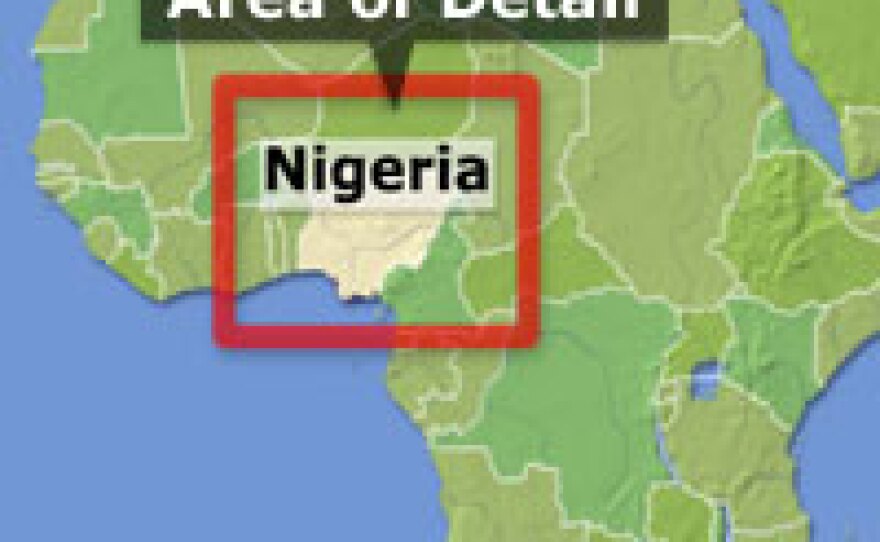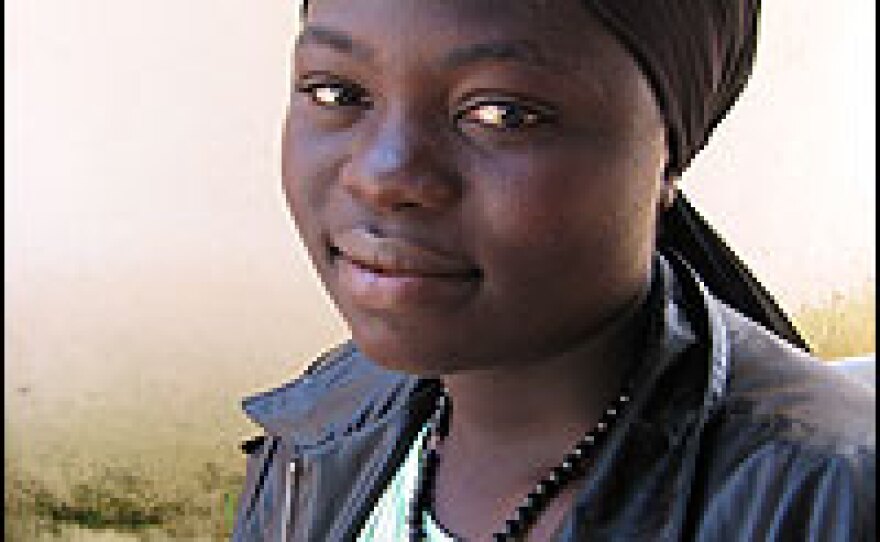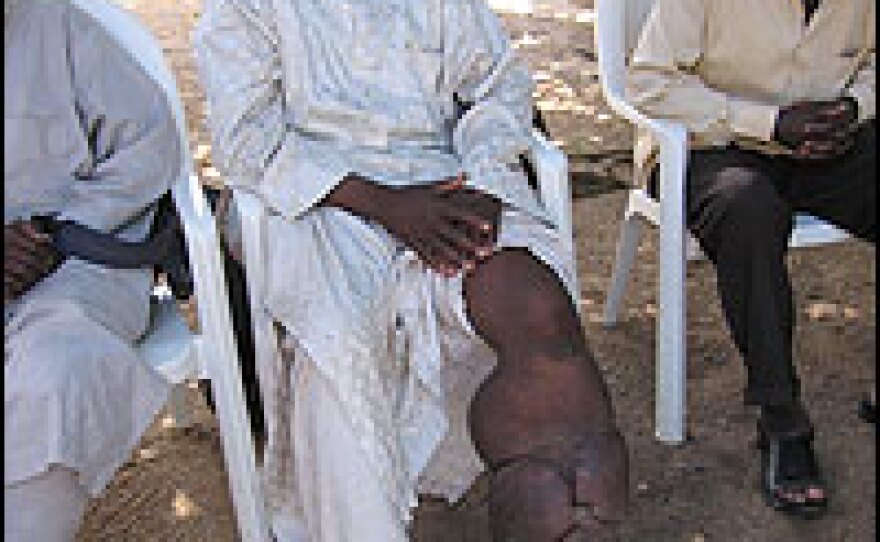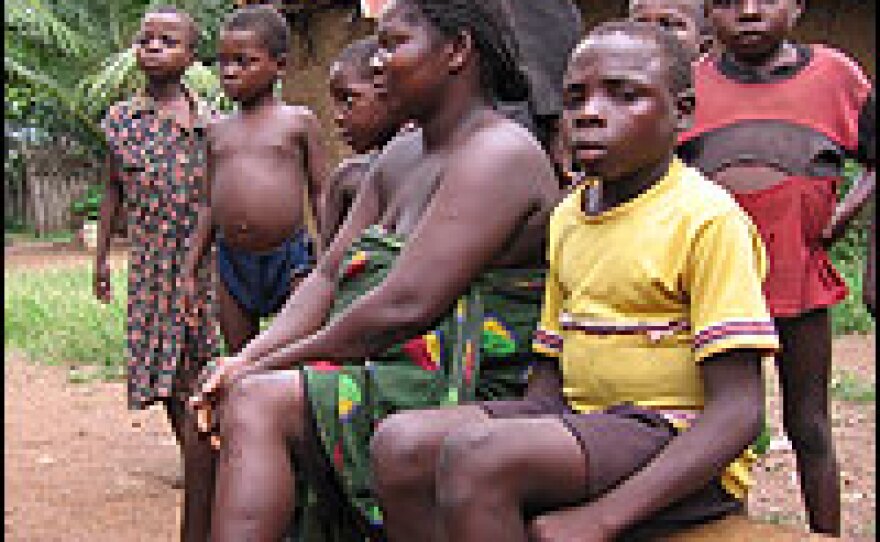


There's a category of illnesses in the developing world called neglected diseases — parasitic diseases that don't kill, at least not very quickly. Over the last 20 years, as the fight against AIDS and malaria captured attention and resources, these infections have been overlooked. International donors are trying to change that in Nigeria and across Africa.
In a plaza in the busy city of Jos, Nigeria, people stand three deep to get medicines donated by GlaxoSmithKline and Merck.
Dr. Abel Eigege is one of the organizers of the event and works for the Carter Center in Jos. He says this medicine will prevent a painful and disfiguring disease — lymphatic filariasis.
It's a disease transmitted by mosquitoes that breed in the stagnant water that gathers in the alleys and side streets of Jos.
"Our hope is most people will turn out to be treated," Eigege says.
There are already more people than the health workers can handle quickly. The people of Jos haven't had access to this kind of medicine much over the past 20 years.
In fact, lymphatic filariasis is one of the group of diseases that have come to be called neglected diseases. Though they infect about 1 billion people worldwide and most are easily preventable, many are not effectively treated.
For example, only a few pills, taken once a year, will protect these people in Jos from the horribly swollen legs and other symptoms of lymphatic filariasis.
Dabiyak Damulak, health commissioner of this region in central Nigeria, says such diseases are neglected because he has other, bigger, health problems to worry about.
"We tend to focus on the pressing issues and then allocate resources," Damulak says.
AIDS and malaria — virulent killers — are his top concerns.
Lymphatic filariasis, schistosomiasis, guinea worm, river blindness, leishmaniasis and the other neglected diseases are all disabling, in some cases permanently. But if they kill, it's only after years of infection.
These diseases are so prevalent they've become almost a condition of life in developing countries. The parasites that cause them breed in the water that people use for drinking and swimming, the water that stands in urban ditches and rural ponds and rushes in river gullies in the rainy season.
Near the rural town of Nasarawa North, young boys happily splash in a river that most likely contains the parasite that causes schistosomiasis.
A health worker gathers the boys and asks them, "How many of you have red urine?" Blood in the urine is a key symptom of schistosomiasis.
At least half raise their hands. And as they talk further, it turns out many of the children are several years older than they look. Studies done in Kenya show that schistosomiasis not only stunts the growth of children, it causes them to score lower on intelligence tests and wears down the immune system, opening the door to other diseases.
Neglected diseases hurt people economically. Though 9-year-old Monday Mweke had guinea worm disease, he was still able to help his mother with family chores – fetching water and wood, taking goods to the market. Yet the disease is so painful it can keep farmers from working their fields for months at a time.
Monday is an ambitious boy. He whispers that he wants to have a big job someday.
"Maybe even governor," he says.
But any ambition, even the most realistic, will be hard for Monday to achieve if he is ill and in pain. When he had guinea worm, he missed three months of school and ended up staying back a year, which added an extra year of school fees for his parents.
Neglected diseases can also be socially devastating. Health expert John Umaru of the Carter Center tells the story of a woman with lymphatic filariasis who was ostracized because of her swollen limbs. The grotesque deformity provokes irrational fear.
"She couldn't attend church services, people would be run away," Umaru says. "If she comes and sit down, a person might leave."
Neglected diseases are finally getting some attention and money. Hundreds of millions of dollars are coming into developing countries from donors and governments, partly because it's become apparent these diseases make people more vulnerable to AIDS and malaria.
But money and free medicine won't solve all of health minister Damulak's problems with neglected diseases. He still has to make tough choices. Most grants and most "free" drug programs require him to come up with matching cash or workers, a practice known as counter-funding.
"It's not that the government doesn't want to counter fund, it's that the fire is burning in so many places," Damulak says. "So when the fire is going down a little, you want to put out the fire on another site."
Damulak can't keep spending on a neglected disease program when the fires of AIDS and malaria flare up. Last year, he spent three times as much on AIDS and four times as much on malaria as he spent on lymphatic filariasis and schistosomiasis.
Copyright 2022 NPR. To see more, visit https://www.npr.org. 9(MDAzMjM2NDYzMDEyMzc1Njk5NjAxNzY3OQ001))







